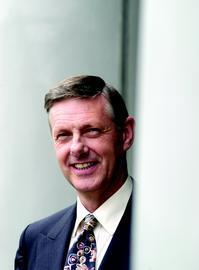Manly sees this group including the many engineers who work in contracting, facilities management and maintenance as well as manufacturing.
He wants membership of the Institution to remain relevant to all today's engineers: "We need to maintain our status as a centre of technical knowledge, but we also need to be more inclusive."
In his inaugural address in May, Manly picked out four key issues to address: contractual arrangements; sustainable development; innovation and off-site fabrication; and resources and competencies.
Manly's themes for his presidential year are borne out of his own experiences in the industry. He took a three year higher national diploma in environmental engineering at the National College (now South Bank University). "This included six months' work experience. I went to work at J Jeffreys (now Balfour Kilpatrick), where I met Michael Cooling who eventually became a CIBSE president himself. He acted as a personal mentor to me for some time."
Manly feels that his time at Jeffreys was crucial for building the skills necessary for every engineer: "In design and construct you need technical, practical, and commercial elements. I spent three months in the estimating department which taught me a lot about costing and commercial issues. I was fortunate in having technical, practical and commercial skills.
"In a way I have found that's what is lacking in many engineers in our industry. And one of the reasons for my theme.
"I believe that by having any one of those elements lacking, engineers are not able to do the job as competently as they should."
After eight years at Jeffreys, rising to senior design engineer, Manly entered the family business A G Manly & Company in 1972 as a contracts manager. He rose through the management ranks and on his father's death in 1982, Manly took over the reins as managing director. "The rest," he says, "is history."
The company was taken over in 2000 by Gratte Brothers where Manly is now business development director.
Like many engineers who move into business management, Manly was aware that it's possible to lose touch with the technical and practical aspects of the work.
"I have been determined not to do that. Through my work with the HVCA and BSRIA, where I've been on council and committees, I have stayed in touch with the engineering side. But in my time I have also acquired experience in contractual arrangements – the other area I was keen to address as CIBSE president."
The new President's real concern is that engineers achieve the level of competence which others in construction expect of them, and which will gain them the respect they want. "Of course we have highly capable experts in building services, but I think that there are many engineers who fall below the level required and don't have the knowledge they should. We need to greatly improve this level of competence to advise clients correctly – to earn the professional place we deserve."
Services engineers should have an influence on the shape and function of buildings. "I would like to see architects creating the concept, and then calling in the services engineer. At the moment, that doesn't happen." The element of competence is also badly needed if our sector is to raise its profile with the public at large.
As an example to follow, Manly cites structural engineers. "They have the competence; the technical and usually the commercial knowledge allied to know-how. They can advise clients well. Many structural engineers work closely with architects because architects know these engineers can help them solve their design problems."
Four key challenges may seem like a lot for Manly to put on his plate. But he says that many of these issues are being dealt with by existing bodies and "there's no point reinventing the wheel." Without doubt, this president's focus is on creating a pool of engineers who can deliver what clients want – quality advice and buildings that work.
Source
Building Sustainable Design























No comments yet